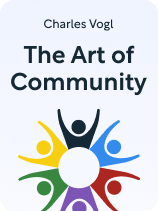

This article is an excerpt from the Shortform book guide to "The Art of Community" by Charles Vogl. Shortform has the world's best summaries and analyses of books you should be reading.
Like this article? Sign up for a free trial here.
Does your community feel too small? What are the best practices for community growth?
When your community is at a point where it’s been strengthened by lore, emblems, and keepsakes, it’ll be ready to invite new members. Charles Vogl has some tips for incorporating new members and discusses how to use stratification to your community’s advantage.
Let’s look at the key ways to grow your community so it can reach new people.
Incorporating New Members
Vogl explains that when communities truly believe in their moral code, they’ll want to encourage community growth by opening their group to all who could benefit from joining it. However, communities should have barriers to admittance—a line that separates those who are welcome within the community and those who aren’t, based on whether they share the same moral code. (Vogl calls this the Boundary Principle).
(Shortform note: Sociologists explain that there are two kinds of barriers to admittance to communities: symbolic boundaries and social boundaries. Symbolic boundaries are concepts people use to distinguish between members and non-members of a group—for example, if your community only admits people under 30, “youth” might be one of the symbolic boundaries that maintains your group’s exclusivity. Social boundaries are concrete or material manifestations of symbolic boundaries; for example, if your community only admits people with college degrees, you’re using formal education as a social boundary to separate members and non-members.)
Vogl explains that many communities believe exclusivity is unfriendly or unfair, but he argues that barriers to admittance help community members feel safe: When the barriers are maintained, the community knows it won’t be infiltrated by people who don’t share their moral code and who would judge or even sabotage them because of their choices and beliefs. Without barriers to admittance, trust and connection eventually erode, which may cause members to become disillusioned and leave.
(Shortform note: In The Art of Gathering, Parker agrees with Vogl that exclusivity helps you protect your group from people who disagree with your beliefs and who might sabotage or distract your group from its purpose. For this reason, Parker views the decision not to invite non-members to group activities as an act of compassion toward members of your group. There may be reason to believe this is compassionate toward non-members, too: Psychologists explain that we have an inherent tendency to treat members of the groups we belong to better than non-members, no matter the circumstances. If you invited non-members to join community events, you might treat them poorly without meaning to—so it’s better not to invite them at all.)
Using Stratification to Your Community’s Advantage
As your community grows, stratification (a division between more experienced and less experienced members) will naturally occur. Vogl (who calls this the Inner Rings Principle) explains that stratification is a good thing—it gives members something to aspire to, as it shows that there’s a potential for developing their skills and moral sensibilities and becoming better versions of themselves.
However, stratification can also present a problem when members feel compelled to continually climb to higher and higher ranks because they desire prestige. This is unhealthy because when you’re always aiming to achieve something more, you’re never satisfied with what you have now.
To remedy this pitfall, Vogl recommends that you prioritize building relationships over seeking status. Recall that the fundamental purpose of a community is to bring people together so they can support each other’s growth. If you keep that goal in mind, you’ll be more satisfied with simply being part of your community and less likely to pursue endless advancement. To help you focus on this priority, Vogl recommends participating in community activities that you enjoy often—this will enhance your connections with other members and bring you a natural sense of fulfillment.

———End of Preview———
Like what you just read? Read the rest of the world's best book summary and analysis of Charles Vogl's "The Art of Community" at Shortform.
Here's what you'll find in our full The Art of Community summary:
- The fundamental guidelines all communities should follow
- How to institute a community meeting place and set of customs
- How you can enhance belonging within your community






